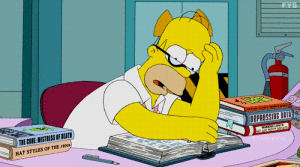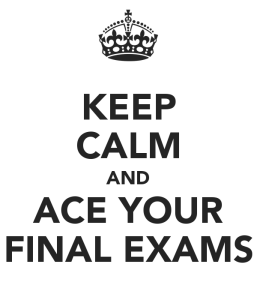It’s crunch time. With the end of semester approaching and finals just around the corner, the majority of us will be spending hours away studying to rack up the most amount of points we can in order to pass this semester. As we begin to spend hours studying and draining the last bit of energy we have, what is the best and most productive way to spend this time in order to save us from complete desperation?
As I was studying for a test that I already had when returning from Thanksgiving break, I began to think about my studying habits. I wondered if using more than one of your senses helps to increase your ability to obtain the information. As I was studying Spanish vocabulary on Quizlet, I started to use the option of hearing the pronunciation of the word simultaneously while reading and remembering the flashcards. By doing so, I wondered if listening and looking would help me to learn better or just create more of a distraction.
I began to research studying and the senses. It turns out that our ability to learn goes back to our early development. “Learning is Multi-Sensory” and studies have shown that using more than one sense can “help information processing.”
An article by The Jerusalem Post states that reading something you learned out loud or writing something down that you recalled learning helps to remember according to researchers at Ariel University. This study was based on the “production effect” which is the when the memory favors words read out loud rather than silently because it involves “numerous types of information processing, including seeing, speaking, sensing by moving the lips and hearing.”
In a series of these studies, researchers showed students a series of written words where some participants read them aloud and the others read them silently. Sounding out the words to the students expanded the experiment further and the students were told to recall the words and write them down. Scientists discovered through these trials that when the students physically wrote the words down they remembered them more than when they only used their hearing. The scientists concluded that “the more senses involved, the better they are recalled.” This goes back to the proven fact that students obtain and remember information better when they hand-write their notes rather than type them.
Researchers from Max Planck Institute for Human Cognitive and Brain Sciences found that vocabulary is better learned if the brain is able to link a word with various sensory perceptions, the vocab is expressed using gestures, and learning with images that link to the word all help in the learning process. All of these aspects were discovered in a study where scientists taught an unknown, made-up language to women and men having them memorize such nouns over a span of a week. A series of experiments were conducted where the subjects heard a word corresponding with an image or gesture, or the subjects imaginarily drew the word in the air or made a gesture, and then were asked to remember the term at various stages of the experiments. The results found that the subjects best recalled a word when the individuals used gestures or observed an image simultaneously.
The conclusion of the study was that the brain does in fact recall words and learned ideas when other senses were involved in the learning process. This discovery may be because when more senses are involved this creates a greater reinforcement of the information therefore having a greater impact on the brain’s ability to recollect the information obtained. An example of this could be that someone who watches a sport on TV will most likely not be as good as someone who actually practices the sport requiring them to use more senses including sight, sound and touch.
The question we are left with then is whether if the more senses we use the better we will learn? …Is it possible that using too many senses could be overwhelming when recalling information resulting in recollection that is not as effective?
Basic listening or reading is one method of obtaining information, but when various senses are additionally used, the learning experience is further increased. So, as finals week approaches, remember to not only read and write to recall but also incorporate gestures and images to advance your studying routine and hopefully your grade!
Here is an article on how all the senses affect our thinking and creative process, possibly furthering our ability to recall and obtain information as well as create new ideas and maybe even help when studying for finals!



Nice post! I don’t know if this works for everyone, but personally I like to listen to jazz while I study. I feel that the intricate rhythms and meters keep my mind on its toes. Some people might find this to be distracting, but personally I am able to listen to the music in the back of my head while I am still totally focused on my work. This is called the Mozart Effect (it also applies to classical music) and here is an article discussing it: http://www.ncbi.nlm.nih.gov/pmc/articles/PMC1281386/. I hope this helps you in your studying for the future, and I wish you the best of luck on your finals!
I would have never thought to incorporate gestures and images into my study routines. One idea you spend much time on is the idea of recall. This makes me think of a famous study done by Godden and Bradley about the idea of context-dependent memory. The basic idea is that you are more likely to recall the information in the environment you learned it in. Godden and Bradley tested to see if 18 divers could remember 36 2-3 syllable words depending on where they learned them (land or underwater) and where they were asked to recall them (land or underwater). All 18 divers received the possible four conditions: learn the words on land and retrieve the words on land, learn the words underwater and retrieve the words underwater, learn the words underwater and retrieve them on land, and learn the words on land and retrieve them underwater. There was a 37 percent recall when learning and recall were both on land, a 32 percent recall when learning and recall were both underwater, only a 24 percent recall when recall was underwater and learning was on land, and only a 23 percent recall when recall was on land and learning was underwater. Though the sample size is small, the experimental design is brilliant and has very few flaws. The concept that one recalls information more effectively in the environment they learned it is now widely accepted thanks to this experiment. I know for many Penn State students, finals do not occur in the same classroom they have learned in all year. But if you want to get creative, maybe find time to study in the room you will be taking your final exam in. This is one of those instances where it certainly does not hurt to try!